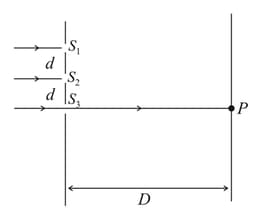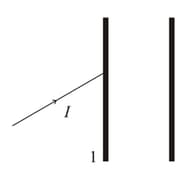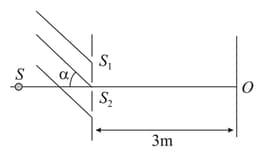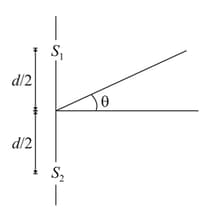Embibe Experts Solutions for Chapter: Wave Optics, Exercise 2: Exercise - 2
Embibe Experts Physics Solutions for Exercise - Embibe Experts Solutions for Chapter: Wave Optics, Exercise 2: Exercise - 2
Attempt the free practice questions on Chapter 31: Wave Optics, Exercise 2: Exercise - 2 with hints and solutions to strengthen your understanding. Alpha Question Bank for Engineering: Physics solutions are prepared by Experienced Embibe Experts.
Questions from Embibe Experts Solutions for Chapter: Wave Optics, Exercise 2: Exercise - 2 with Hints & Solutions
If the first minima in a Young's slit experiment occurs directly in front of one of the slits. (distance between slit and screen and distance between slits , then the wavelength of the radiation used is:
A parallel monochromatic beam of light is incident normally on a narrow slit. A diffraction pattern is formed on a screen placed perpendicular to the direction of the incident beam. At the first minimum of the diffraction pattern, the phase difference between the rays coming from the two edges of the slit is:
In the figure shown three slits and are illuminated with light of wavelength and Each slit produces the same intensity on the screen. If resultant intensity at the point on the screen directly in front of is , then the maximum value of is Find the value of , Also find intensity at a point if is of part .

A narrow monochromatic beam of light of intensity is incident on a glass plate as shown in the figure. Another identical glass plate is kept close to the first one and parallel to it. Each glass plate reflects of the light incident on it and transmits the remaining. The ratio of the minimum and the maximum intensities in the interference pattern formed by the two beams obtained after one reflection at each plate is , find value of

In a Young's experiment, the upper slit is covered by a thin glass plate of the refractive index while the lower slit is covered by another glass plate having the same thickness as the first one but having refractive index Interference pattern is observed using light of wavelength It is found that the point on the screen where the central maximum fell before the glass plates were inserted now has the original intensity. It is further observed that what used to be the maximum earlier, lies below the point while the minimum lies above The thickness of the glass plate is . Find the value of (Absorption of light by glass plate may be neglected)
A parallel beam of light is incident at an angle with the normal to the slit plane in a young’s double-slit experiment. Assume that the intensity due to each slit at any point on the screen is . Point is equidistant from and . The distance between slits is Then choose correct option(s)

A Young's double slit experiment is performed with white light:
In an interference arrangement similar to Young's double-slit experiment, the slits and are illuminated with coherent microwave sources, each of frequency The sources are synchronized to have zero phase difference. The slits are separated by a distance and the screen is at a very large distance from slits. The intensity is measured as a function of , where is defined as shown. Screen is at a large distance. If is the maximum intensity then for is given by:

